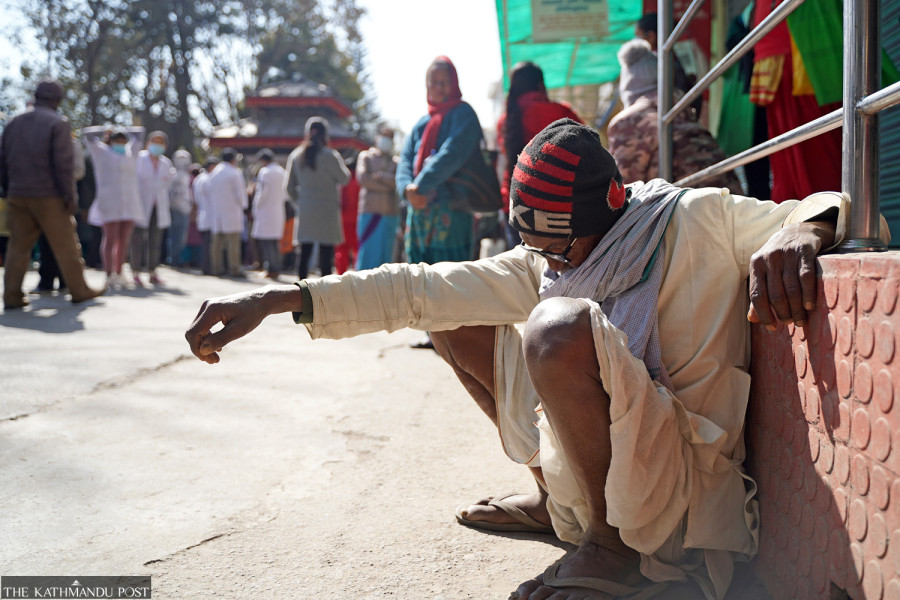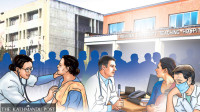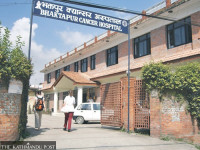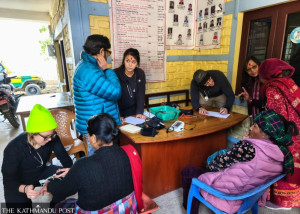Health
Patients suffer as doctors shut hospitals
The strike was called off at 11am Sunday, but services were affected throughout the day.
Arjun Poudel
Doctors at Bir Hospital had given a follow-up appointment on Sunday to Kanchha Man Bal, of Mahabharat Rural Municipality-8 in Kavrepalanchok district, who underwent a pelvic surgery six weeks ago.
He reached the hospital on time hoping that doctors would remove a urinary catheter, which had been placed to drain urine, and he would be able to travel back to his village by bus.
“I have been staying at a guesthouse for the past two months at the cost of Rs500 a night,” complained Bal. “I am already running out of money and the hospital staff told me to come only on Tuesday.”
Like Bal, thousands of patients seeking care at state-run health facilities faced difficulties on Sunday, when they found that all services at health facilities except for emergencies had been shut down to protest Friday’s police assault on a doctor.
The Nepal Medical Association, an umbrella organisation of medical and dental doctors, announced the protest after a doctor serving at the National Trauma Center was assaulted by police for walking on the road during a temporary ban on movement to make way for the presidential convoy.
President Bidya Devi Bhandari’s motorcade was on its way back to Sheetal Niwas when the incident happened.
Agitating doctors boycotted the services and protested inside hospital premises against the assault. They also wore black armbands and displayed placards in protest.
“This is a dispute between a doctor and the police, but people like us who come to Kathmandu for treatment have been forced to bear the brunt,” complained Dip Raj Aire, a local from Gamgadhi in Chhayanath Rara Municipality-6 of Mugu district. He said he is in Kathmandu to treat his ailing father.
According to Aire, he came to Kathmandu 11 days ago after doctors at the hospital in Jumla referred his father Til Bahadur to Bir Hospital for a gallbladder removal surgery. Doctors at Bir Hospital admitted Til Bahadur and started diagnosis of his health problems.
“It has already been 11 days but the diagnosis remains incomplete,” said Til Bahadur. “I have been suffering from a burning sensation all over my body. Doctors have so far not given me any medicine.”
His son complained he has already spent Rs50,000, which he had borrowed from an individual at 36 percent interest, and now did not have money even to pay bus fare to return home.
“We were hoping the doctors would say something about the ailment, but they did not come today to see my father,” said Dip Raj.
Agitating doctors called off their protest following a six-point deal between their association and the government at 11am Sunday, but by then many patients had returned home. Some senior doctors serving at the state-run health facilities too had already left the hospitals.
Among other things, the government has promised to study and amend the Working Procedures for Security of VVIP-2077 BS within a week, take action against the policeman involved in beating up the doctor and fully implement the laws formulated for the safety of health institutions and health workers.
Some doctors from the medical fraternity expressed their disagreement on social media with the nationwide disruption of services at hospitals.
“The decision to shut down all services except for emergency ones against the assault on Dr Singh [Janith Singh] is wrong,” Dr Anup Subedee wrote on Twitter. Assault on doctors by police is wrong and definitely a punishable crime and must be protested against, but the disruption of services across the country by the medical association cannot be justified, he wrote.
Doctors should not punish hundreds of thousands of hapless people across the country to avenge the misdeeds of a mindless cop, the doctor wrote on Twitter, adding, “Let’s do the right thing, not the easy thing.”
Meanwhile, President of Nepal Medical Association Dr Lochan Karki claimed that the nationwide shutdown of hospital services was not a choice but compulsion of doctors to make the government heed their concerns.
“Had the authorities called us for talks before the start of the protest, we wouldn't have had to disrupt the services,” said Karki. “This time the government agreed to carry out a study and amend the Working Procedures for Security of VVIP-2077 within a week and implement it immediately; this will ease our difficulties caused by VVIP convoy in future.”
Thousands of patients, especially those who cannot afford expensive treatment at private healthcare facilities visit state-run hospitals, where services are provided at comparatively cheaper rates.




 10.12°C Kathmandu
10.12°C Kathmandu














